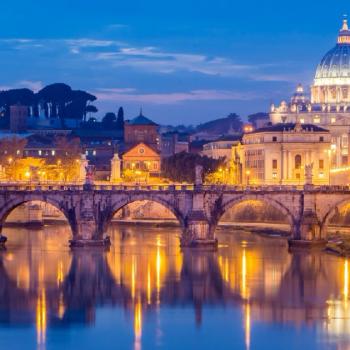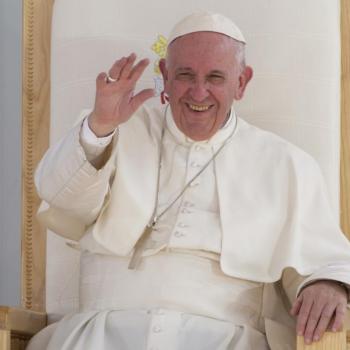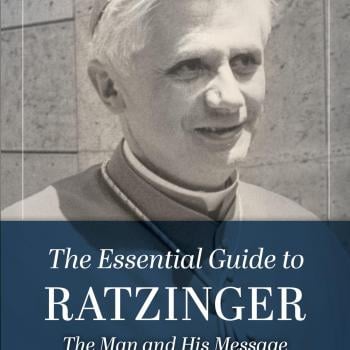
Historical Overview
Nature and Grace – two simple words with incalculable importance in the life of the Church. Their ecclesial origin can be traced back directly to the Gospels, while their importance could be seen to have become popularized at least as early as the time of St. Augustine who has been termed the Doctor of Grace.
Their importance persists to this day in theological discussions about the relationship between human nature and divine grace, particularly in terms of how individuals can achieve salvation or union with God. It also has significant metaphysical and epistemological implications for understanding the dynamics between God’s transcendence and immanence, the relationship between God’s free will and human free will, and the interplay of various paradoxical elements relating to the creation of man and his ultimate salvation. This is obviously an existential sort of issue with massive implications.
Matthias Joseph Scheeban, a prominent 19th century theologian, and another “doctor of grace” encapsulates the issue in this way,
“The concept of man’s nature influences the whole area of philosophy. Similarly the concept of man’s place in Christianity is supremely important for its entire system of mysteries.”(Scheeban, Nature and Grace, [Eugene, OR: Wipf and Stock, 2009], xvii). For Scheeben, the nature and grace debate is primarily about understanding how human beings can participate in the divine life of God through the gift of grace. Hans Urs von Balthasar, a 20th century theologian, in his series Explorations in Theology, argues that the nature and grace debate is ultimately a question of the nature of God’s relationship to the world. He poses the question,
How is love’s fellowship between God and man possible, given that the otherness of the persons is so great and finds no sheltering framework within the equality of one nature (as is the case between mother and child)? Is not such a relationship of love between those who belong to different ‘species’ unnatural, precisely because there is no common nature? This leads us to the whole complex of the question about nature and grace, of knowledge of God and love of God through nature and grace, in which alone the structure of the knowledge of God becomes truly clear. (Hans Urs von Balthasar, Explorations in Theology, Vol. III: Creator Spirit [San Francisco: Ignatius Press, 1993], 30).
According to von Balthasar, this then is a question thus of how God interacts with the world and how humans can participate in His divine activity.
A 21st century Catholic writer, Andrew Swafford, in his book “Nature and Grace: A New Approach to Thomistic Ressourcement,” emphasizes the importance of understanding the relationship between nature and grace in terms of the human person. He summarizes the issue this way, “It is rightly said that the topic of nature and grace touches almost any and every theological and even human question, for one’s appraisal of this issue transforms the way in which one understands the very encounter between man and God” (Andrew Swafford, Nature and Grace [Eugene, OR: Pickwick Publications, 2014], 1). For Swafford, the nature and grace debate is about understanding the dynamic relationship between God and humanity, and how this relationship plays out in the lives of individual human beings.
This all seems relatively straightforward right? Wrong.
The Dilemma
This debate over the relationship of nature and grace has become one of the fiercest debates in modern ecclesial history. In the 1950s, this theological discussion erupted, this time with a fiery vengeance.
During this time, owing to the Ressourcement movement, there became a renewed interest in the theological writings of the Church Fathers and medieval theologians, who had made important contributions to the nature and grace debate in earlier centuries.
The publication of Henri de Lubac’s groundbreaking work “Surnaturel”, in 1946, which drew heavily on the thought of Rousselot and Suarez, against the likes of Cajetan, was a seismic event in the world of Catholic theology.
De Lubac’s thesis was simple yet revolutionary: he rejected the prevailing notion in neo-scholasticism that grace was a kind of external addition to human nature, something often termed “pure nature,” arguing instead that grace was an integral and inseparably bound aspect related to human nature from the beginning. This was a bold and radical claim that flew in the face of centuries of entrenched theological thought, and it was bound to stir up controversy and debate among theologians and scholars alike.
And stir up controversy it did.
The Dominicans Versus the Jesuits
De Lubac’s work was met with a storm of criticism and condemnation from many quarters, especially from the Dominicans at Le Saulchoir. The Dominicans, known for their traditional Thomistic understanding of nature and grace, opposed de Lubac’s views, on the grounds that it departed from the understanding of grace present in the writings of St. Thomas, with some accusing de Lubac of promoting a kind of naturalism or Pelagianism that denied the need for divine grace altogether. Others accused him of being too focused on the role of human effort and agency in the attainment of salvation, arguing that he had downplayed the centrality of grace in the equation. Fr. Reginald Garrigou-Lagrange, a professor at the Angelicum, was de Lubac’s fiercest opponent. He argued that de Lubac’s emphasis on the essential unity of nature and grace risked blurring the distinction between the two and undermining the supernatural character of grace. Granted not all the Dominicans were as opposed to De Lubac’s work. Figures like Marie-Dominique Chenu, another key figure in the Ressourcement movement, (also known as “nouvelle théologie”) emphasized the importance of a holistic and integrated approach to this question that took into account the whole of human experience, including its natural and social dimensions. He argued that a narrow and overly abstract understanding of grace risked overlooking the complexity and richness of human existence, and that a more dynamic and experiential approach was needed to fully appreciate the relationship between grace and nature.
The Jesuits, many of whom were also engaged in these debates and who were influenced by de Lubac’s work, in contrast to the more critical Dominicans, tended to take a slightly more nuanced approach to this dynamic issue.
Its Contemporary Status
De Lubac’s work, despite the controversies, continued to be influential in shaping the debate over nature and grace in the decades that followed, and it helped to shift the focus of theological discussion away from a more narrowly defined notion of grace as a kind of “supernatural reward” for human effort – or a building upon nature, as a kind of two-tiered system. De Lubac insisted that this concept was not to be found in St. Thomas but only in his later commentators, and that his (de Lubac’s) understanding of nature was closer to the Church Fathers’.
De Lubac’s work, in contrast to the neo-scholastics and their disciples, emphasized the deep interconnectedness between the natural and supernatural aspects of human existence, and the importance of understanding the role of grace in shaping the whole of human life. Many theologians have pointed out that these themes are exceedingly prominent in the documents of Vatican II, which developed a robust pastoral response to a variety of doctrinal issues which had been up to that point, without practical guidelines in how their potency could be concretely established in the natural order. Some of these issues, such as interfaith dialogue and prayer, which justifies itself on the basis of the seeds of truth present in all things, and the religious impulse innate in man, guiding men towards all truth, were greatly aided by this new understanding of grace as an intrinsic feature of man.
Debates continue to rage to this day about whether De Lubac indeed did depart from the Aquinian understanding of the question. Seemingly irreconcilable passages within the writings of Aquinas make this very difficult to determine, however.
This discussion, though, will be saved for another time.













